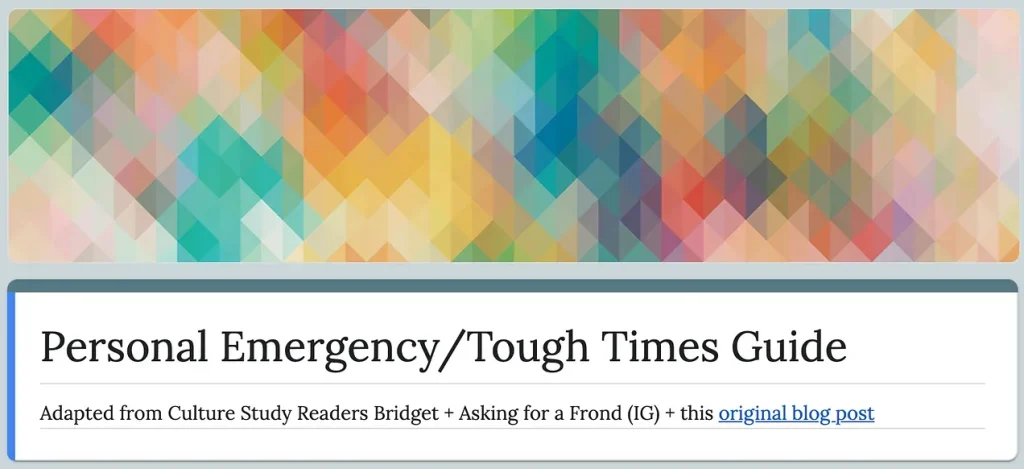A Shortcut for Caring for Others (and Being Cared For Yourself)


We’ve talked about the importance of inter-generational communities, and the general exhale of relief that comes when you realize you don’t have to sell your life today, and what happens when a lack of other options results in coerced care.
Do I wish that the U.S. government took the formation of a social safety net seriously, and eased the pressure on these communities of care? Absolutely. Do I want to work towards making every day more sustainable for everyone in the meantime? Yes. Which is another way of saying that this is absolutely a structural problem, and while we figure out how to make structural fixes permanent, we need to figure out how to give and receive care on the ground. I want to underline the two parts of that last sentence: a lot of us are good at giving or being ready to give care. But we also need to be better at asking and receiving it, because all of this community work depends on divorcing ourselves from an understanding of anyone, anyone, as uniquely givers or receivers.
But the reality is: a lot of us are very, very bad at giving or even asking for, let alone receiving, help. This Friday’s Subscriber thread goes deep into the reasons why — and here are some of its recurring, challenging themes:
1.) Independence and self-sufficiency have been or have become a core part of your identity — either out of necessity (as a trauma response) or because their independence and self-sufficiency was praised and valued (see especially: white rugged individualism). To ask for help feels like undercutting your entire self.
2.) You haven’t been around examples of healthy community or dependence — particularly within your family — and don’t have models of what it means to safely ask for help. This is particularly true for people whose independence is, in some way, a trauma response, but I also think it’s true of people who grew up in homes where the adults were solitary or isolated, or where everyone in the family talked shit about other members of the family who asked for help.
3.) You’ve always been the helper, whether in your vocation/job or just within your friend group. Again: to ask for help would be to undercut that identity. See especially (but not exclusively) Moms, care workers, teachers, etc.
4.) The feeling that because of how your life outwards appears — “together,” “without children,” “without physical signs of illness” — that you shouldn’t need help, because you have it so much easier than your friends/family who have ostensibly more “difficult” lives. Everyone’s lives are difficult in different ways but we definitely rank difficulty and equate “easier” with “never ever needs help.”
5.) Previous attempts at reaching out for help have been rebuffed or ignored, and it hurt so much that you never want to ask again. This one’s really hard. It’s also related to the feeling, as one commenter put it, “that there’s no help to be had.” Everyone else is just treading water.
6.) You feel that you have so many ongoing needs that you need to preserve your “asks” for when you really, really need it. This is particularly true of people who are disabled or are dealing with chronic illness — you feel like you don’t want to go back to the well too many times.
7.) Through upbringing, culture, or family, you’ve internalized that suffering is good, and asking for help is asking to alleviate that important suffering. See: a lot of Christian religious traditions. If/when you try to avoid that suffering, there’s a sense of shame in asking for some measure of ease.
8.) Masculinity, masculinity, masculinity. Real men don’t ask for help, etc. etc. I don’t have to elaborate on this one because it’s so simple and so frustrating in its simplicity and endurance.
9.) Simply not having the community or family or friend group that you feel comfortable enough to even ask for help in the first place. This is particularly hard for people who’ve moved to a new place, people without family they trust, people who’ve been alienated from their former friend group because of pandemic practices or politics, people who’ve left their religious tradition, etc.
10.) You feel so overwhelmed that you don’t even know what to ask for. People might ask you if there’s anything they can do to help, but you have no idea where you’d even start. See also: not even realizing that you need it, in part because we’ve been conditioned to ignore our body and mind’s calls for help. As one commenter put it, “I’m just ploughing along through weeks and weeks as life is getting incrementally more overwhelming and difficult and I just keep thinking why does everything feel so bad until one day I can’t get out of bed.”
Some of these struggles are deeply psychologically embedded — and no matter how much structures change, no matter how much you seek out community, you’re still going to be battling the fundamental belief that you’re a burden. How do you unlearn that?
Continue Reading
One of our country’s most important freedoms is that of free speech.
Agree with this essay? Disagree? Join the debate by writing to DailyClout HERE.



